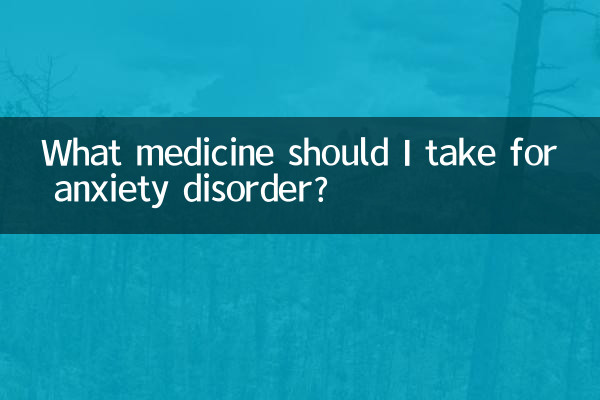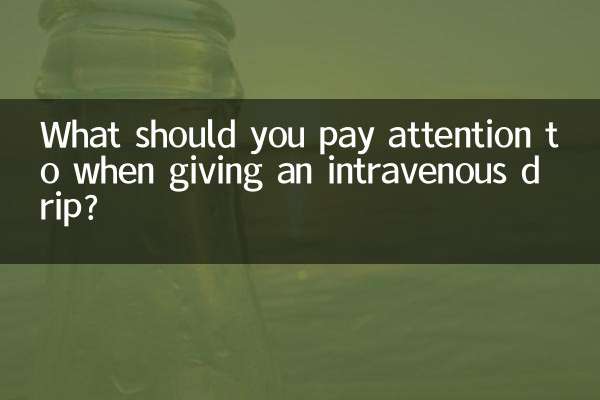What medicine should I take for anxiety? Hot topics and scientific medication guides on the Internet in the past 10 days
Recently, mental health issues have once again become the focus of social attention, especially drug treatment options for anxiety disorders, which have triggered widespread discussion. This article combines the hot topics on the Internet in the past 10 days, compiles authoritative medication guidelines and frequently asked questions by patients, and helps you deal with anxiety disorders scientifically.
1. Top 5 hot topics related to anxiety in the entire network (data statistics period: last 10 days)

| Ranking | Topic keywords | Number of discussions (10,000) | main focus |
|---|---|---|---|
| 1 | Anxiety disorder self-assessment | 128.6 | Reliability of online assessment tools |
| 2 | Anti-anxiety medication side effects | 95.3 | drug dependence discussion |
| 3 | Traditional Chinese Medicine VS Western Medicine | 82.1 | Rising attention on traditional medical treatments |
| 4 | student group anxiety | 76.8 | Special characteristics of adolescent medication |
| 5 | drug price fluctuations | 63.4 | Medical insurance policy consulting |
2. List of commonly used clinical anti-anxiety drugs
| drug type | Representative medicine | Onset of effect | Applicable symptoms | Things to note |
|---|---|---|---|---|
| SSRIs | Paroxetine, Sertraline | 2-4 weeks | generalized anxiety | Need to continue taking |
| SNRIs | Venlafaxine, duloxetine | 1-2 weeks | With somatic symptoms | Monitor blood pressure |
| Benzodiazepines | diazepam, alprazolam | 30 minutes | acute attack | short term use |
| beta blockers | propranolol | 1 hour | Heart palpitations and trembling | Use with caution in asthma |
3. Five medication issues that patients are most concerned about
1.How to avoid drug dependence?It is recommended that benzodiazepines should be used for no more than 4 weeks. Although SSRIs are not addictive, they need to be discontinued gradually according to medical advice.
2.Can Chinese medicine replace Western medicine?Prescriptions such as Bupleurum Shugan Powder can be used as auxiliary treatment, but moderate to severe anxiety still requires standardized medication, and the combined program requires the guidance of professional Chinese physicians.
3.Side Effects Coping StrategiesInitial reactions such as nausea and dizziness will gradually subside and can be alleviated by taking the medicine after meals and adjusting the dose. Serious adverse reactions require timely follow-up.
4.Medication for special populationsPregnant women need to evaluate the risk-benefit ratio, children's medication must be calculated strictly based on kilograms of body weight, and the elderly should be alert to the risk of falls.
5.drug interactionsHerbal preparations such as St. John's wort may affect the efficacy of the medicine, and alcohol will aggravate central depression. During medication, the doctor should be informed in detail of all substances being used.
4. Latest treatment trends and expert advice
According to the diagnosis and treatment consensus recently released by the "Chinese Journal of Psychiatry", it is emphasized that"Personalized Medicine"in principle:
• Genetic testing-assisted drug selection technology is gradually becoming more popular, and CYP450 enzyme testing can predict differences in drug metabolism.
• The effectiveness of the combined cognitive behavioral therapy (CBT) and drug program increased to 82%
• New drugs such as Vortioxetine have both anti-anxiety and cognitive function improvements
Special reminder from experts: Internet popular"Self-diagnosis and medication"There are major risks. An "anti-anxiety health product" recommended by an internet celebrity was recently found to contain the illegal ingredient diazepam. It is safe to go to a regular medical institution for treatment.
5. Patient medication diary template (suggested recording content)
| time | dose | Symptom changes | side effect | sleep quality |
|---|---|---|---|---|
| Example: 8.1 am | Paroxetine 20mg | palpitations reduced | Slightly dry mouth | 6 hours (woke up once) |
Medication for anxiety disorders is a systematic project and requires regular follow-up visits to adjust the plan. The data in this article come from the National Drug Administration’s Adverse Reaction Monitoring Center, recent public information from the pharmacy departments of major hospitals, and popular consultation statistics from professional medical platforms. Keep in mind that the most appropriate medication will need to be evaluated and prescribed by a professional physician based on your specific situation.

check the details

check the details